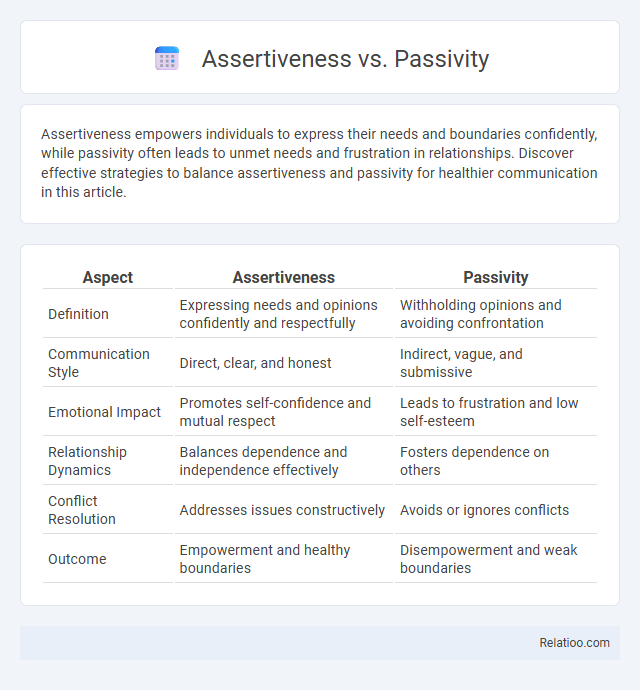Assertiveness empowers individuals to express their needs and boundaries confidently, while passivity often leads to unmet needs and frustration in relationships. Discover effective strategies to balance assertiveness and passivity for healthier communication in this article.
Table of Comparison
| Aspect | Assertiveness | Passivity |
|---|---|---|
| Definition | Expressing needs and opinions confidently and respectfully | Withholding opinions and avoiding confrontation |
| Communication Style | Direct, clear, and honest | Indirect, vague, and submissive |
| Emotional Impact | Promotes self-confidence and mutual respect | Leads to frustration and low self-esteem |
| Relationship Dynamics | Balances dependence and independence effectively | Fosters dependence on others |
| Conflict Resolution | Addresses issues constructively | Avoids or ignores conflicts |
| Outcome | Empowerment and healthy boundaries | Disempowerment and weak boundaries |
Understanding Assertiveness and Passivity
Assertiveness involves confidently expressing one's thoughts, feelings, and needs while respecting others, promoting clear and effective communication. Passivity, by contrast, is characterized by avoiding confrontation or suppressing one's own opinions, which can lead to misunderstandings and unaddressed conflicts. Developing strong interpersonal skills requires balancing assertiveness and passivity to foster healthy relationships and effective dialogue.
Key Differences Between Assertive and Passive Behavior
Assertive behavior involves expressing your thoughts and needs clearly and confidently while respecting others, whereas passive behavior often leads to unexpressed feelings and unmet needs due to avoidance or hesitation. Interpersonal skills hinge on balancing assertiveness and empathy, enabling effective communication and healthy boundaries. You can improve relationships and self-esteem by recognizing and practicing assertiveness over passivity.
Core Traits of Assertive Individuals
Core traits of assertive individuals include clear communication, confidence, and respect for both personal boundaries and others' rights. They express their thoughts and feelings directly and honestly while maintaining empathy and active listening. This balance enhances interpersonal skills by fostering mutual understanding and reducing conflicts in social and professional interactions.
Signs and Consequences of Passivity
Passivity often manifests through avoidance of eye contact, difficulty saying no, and a tendency to prioritize others' needs over personal boundaries, leading to feelings of resentment and decreased self-esteem. Individuals exhibiting passive behavior may experience missed opportunities, increased stress, and diminished respect from peers. Developing assertiveness as a core interpersonal skill enhances communication, promotes healthier relationships, and prevents the negative outcomes associated with passivity.
Benefits of Assertiveness in Daily Life
Assertiveness enhances your ability to communicate clearly and confidently, fostering mutual respect in personal and professional relationships. This interpersonal skill helps you set boundaries, manage conflicts effectively, and express needs without aggression or passivity. Developing assertiveness promotes emotional well-being and boosts self-esteem by ensuring your voice is heard and valued.
Negative Impacts of Excessive Passivity
Excessive passivity in interpersonal skills often leads to unresolved conflicts, diminished self-esteem, and increased stress levels as individuals fail to express their needs or set boundaries. This behavior can cause misunderstandings and resentment in personal and professional relationships, limiting effective communication and collaboration. Over time, persistent passivity may result in missed opportunities and hinder personal growth and assertiveness development.
Common Myths About Assertiveness and Passivity
Common myths about assertiveness and passivity include the false belief that assertiveness equates to aggressiveness and that passivity reflects weakness or incompetence. Understanding that assertiveness involves confident, respectful communication helps You develop strong interpersonal skills that foster collaboration and mutual respect. Recognizing the value of balanced assertiveness promotes healthier relationships and effective conflict resolution.
Strategies for Becoming More Assertive
Developing assertiveness involves clear communication of thoughts and feelings while respecting others' rights, avoiding both passivity and aggression. Effective strategies include practicing "I" statements to express needs directly, setting boundaries firmly, and maintaining consistent eye contact to convey confidence in interpersonal interactions. Enhancing these skills improves personal empowerment and fosters healthier relationships by balancing self-expression with empathy.
Overcoming Barriers to Assertive Communication
Overcoming barriers to assertive communication requires recognizing the difference between assertiveness, passivity, and the interpersonal skills needed for effective dialogue. You must develop confidence to express thoughts clearly while respecting others, avoiding the pitfalls of passivity that can lead to misunderstandings or resentment. Enhancing interpersonal skills like active listening and emotional intelligence helps break down communication barriers, fostering mutual respect and clearer exchanges.
Balancing Assertiveness and Empathy in Relationships
Balancing assertiveness and empathy in relationships enhances interpersonal skills by fostering clear communication while respecting others' feelings. Assertiveness ensures expressing needs and boundaries confidently, whereas empathy promotes understanding and emotional connection. Effective interpersonal relationships require navigating between these traits to maintain mutual respect and collaboration.

Infographic: Assertiveness vs Passivity
 relatioo.com
relatioo.com